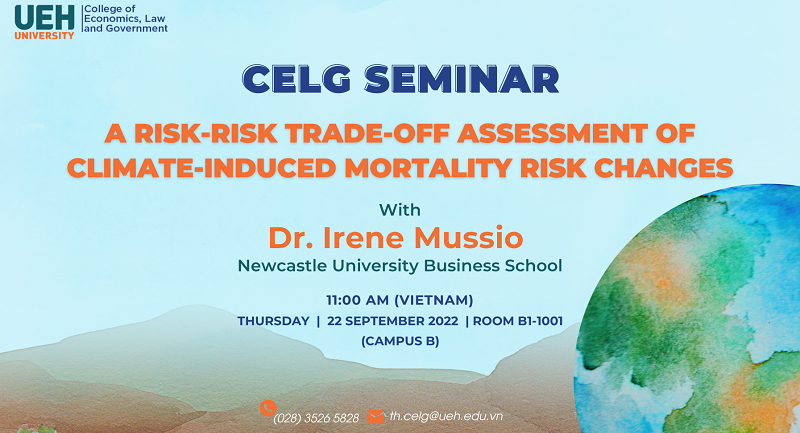CELG seminar: A risk-risk trade-off assessment of climate-induced mortality risk changes

Dear Lecturers, Researchers and Students,
The College of Economics, Law and Government would like to respectfully invite lecturers/ researchers to come and share your experiences at the CELG seminar:
Topic: A risk-risk trade-off assessment of climate-induced mortality risk changes
Presenter: Dr Irene Mussio, Newcastle University Business School
Time: 11:00 AM (Vietnam), Thursday 22nd Sep 2022
Location: Room B1-1001, 279 Nguyen Tri Phuong St, Ward 5, Dist 10, HCMC
To receive CELG seminar information, please fill out this form: https://go.ueh.edu.vn/CELGSseminarinformation
To present and submit a report, please fill out this form: https://go.ueh.edu.vn/CELGseminarpresenter
The impact of climate change on human health was identified as a priority for the UN COP26 conference. In this paper, we consider climate-induced changes to mortality risks and how to incorporate these formally in the policy appraisal process. In the UK, the Value of Statistical Life (VSL) is used to monetize the benefits of policies to reduce mortality risks but it remains an open, empirical question as to whether the current VSL (£2.14 million per fatality prevented, December 2021 values) for traffic accidents should be applied in other contexts without any modification and particularly for extreme weather event fatalities. Using a representative sample of the UK population, we aim to estimate and better understand the trade-offs people make when comparing these risks, drawing on behavioral insights from Construal Level and Regulatory Focus theories. We design a stated preference survey using a relative valuation framework with non-monetary, risk-risk trade-off questions between extreme weather events and traffic accident mortality risks. We find evidence of an extreme weather event risk premium of 1.6 (implying a climate-related VSL of £2.52 to £3.41 million). Allowing for individual-level differences, we find the premium is significantly influenced by both behavioral factors and prior experience. Those psychologically close to climate change weigh extreme weather event mortality risks almost two times the rate of traffic accident mortality risks. However, direct experience of a traffic accident counteracts this, reducing the context premium. We document the importance of behavioral insights in the economic valuation of policy consequences.
About presenter:
Irene is a Postdoctoral Research Associate at the Newcastle University Business School (Economics) and the UKRI GCRF Living Deltas Research Hub. She is an affiliate researcher at the McMaster Decision Science Lab and the Department of Economics at the Universidad de la República, Uruguay (health economics research group). Irene currently manages the Experimental and Behavioural Economics Lab at Newcastle University. Her research interests include environmental, behavioral and health economics. She investigates the relationship between risk and behavior using a range of tools, including experimental and valuation methods.
We wish you and your family good health and happiness.
